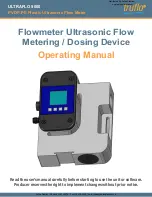
2-7
IM WT310E-17EN
GP-IB Interface
1
2
3
4
5
6
7
8
9
App
Index
2.5
Responses to Interface Messages
Responses to Interface Messages
Responses to Uni-Line Messages
•
IFC (Interface Clear)
Clears the talker and listener functions. Stops data transmission if it is in progress.
•
REN (Remote Enable)
Switches between the remote and local modes.
IDY (Identify) is not supported.
Responses to Multi-Line Messages (Address commands)
•
GTL (Go To Local)
Switches the instrument to local mode.
•
SDC (Selected Device Clear)
• Clears the program message (command) being received and the output queue (see page 7-6
for details).
• Discards *OPC and *OPC? commands that are being executed.
• Immediately aborts *WAI and COMMunicate:WAIT commands.
•
GET (Group Execute Trigger)
The same operation as the *TRG command.
PPC (Parallel Poll Configure) and TCT (Take Control) are not supported.
Responses to Multi-Line Messages (Universal commands)
•
LLO (Local Lockout)
Prohibits switching to local mode by disabling the LOCAL key on the front panel.
•
DCL (Device Clear)
The same operation as the SDC message.
•
SPE (Serial Poll Enable)
Sets the talker function on all devices on the bus to serial polling mode. The controller will poll
each device one by one.
•
SPD (Serial Poll Disable)
Clears the serial polling mode of the talker function on all devices on the bus.
PPU (Parallel Poll Unconfigure) is not supported.
What Are Interface Messages?
Interface messages are also referred to as interface commands or bus commands. They are
commands that are issued by the controller. They are classified as follows:
Uni-line Messages
A single control line is used to transmit uni-line messages. The following three types are available.
• IFC (Interface Clear)
• REN (Remote Enable)
• IDY (Identify)
















































